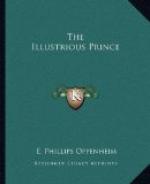“None whatever,” Coulson declared.
“How do you know?” his companion asked quickly.
“Well, I’ve lied to those reporters and chaps,” Coulson admitted,—“lied with a purpose, of course, as you people can understand. The money found upon Fynes was every penny he had when he left Liverpool.”
The young man set his teeth.
“It’s something to know this, at any rate,” he declared. “You did right, Coulson, to put up that bluff. Now about the duplicates?”
“They are in my suitcase,” Coulson answered, “and according to the way things are going, I shan’t be over sorry to get rid of them. Will you take them with you?”
“Why, sure!” Vanderpole answered. “That’s what I’m here for.”
“You had better wait right here, then,” Coulson said, “I’ll fetch them.”
He made his way up to his room, undid his dressing bag, which was fastened only with an ordinary lock, and from between two shirts drew out a small folded packet, no bigger than an ordinary letter. It was a curious circumstance that he used only one hand for the search and with the other gripped the butt of a small revolver. There was no one around, however, nor was he disturbed in any way. In a few minutes he returned to the bar smoking room, where the young man was still waiting, and handed him the letter.
“Tell me,” the latter asked, “have you been shadowed at all?”
“Not that I know of,” Coulson answered.
“Men with quick instincts,” Vanderpole continued, “can always tell when they are being watched. Have you felt anything of the sort?”
Coulson hesitated for one moment.
“No,” he said. “I had a caller whose manner I did not quite understand. She seemed to have something at the back of her head about me.”
“She! Was it a woman?” the young man asked quickly.
Coulson nodded.
“A young lady,” he said,—“Miss Penelope Morse, she called herself.”
Mr. Richard Vanderpole stood quite still for a moment.
“Ah!” he said softly. “She might have been interested.”
“Does the chief want me at all?” Coulson asked.
“No!” Vanderpole answered. “Go about your business as usual. Leave here for Paris, say, in ten days. There will probably be a letter for you at the Grand Hotel by that time.”
They walked together toward the main exit. The young man’s face had lost some of its grimness. Once more his features wore that look of pleasant and genial good-fellowship which seems characteristic of his race after business hours.
“Say, Mr. Coulson,” he declared, as they passed across the hall, “you and I must have a night together. This isn’t New York, by any manner of means, or Paris, but there’s some fun to be had here, in a quiet way. I’ll phone you tomorrow or the day after.”
“Sure!” Mr. Coulson declared. “I’d like it above all things.”
“I must find a taxicab,” the young man remarked. “I’ve a busy hour before me. I’ve got to go down and see the chief, who is dining somewhere in Kensington, and get back again to dine here at half past seven in the restaurant.”




